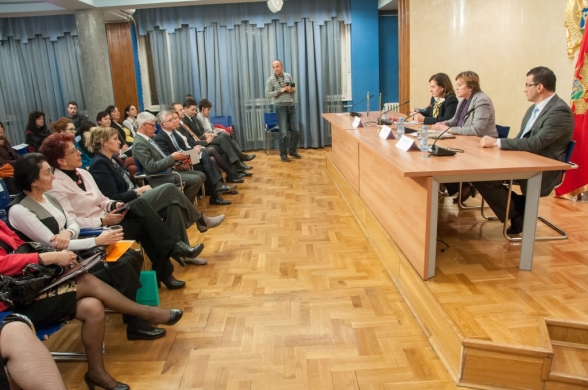Agenda – Political participation of women in the accession process to the EU.
The Gender Equality Committee organized 21st meeting on the topic – Political participation of women in the accession process to the EU. The meeting was attended by Ms Alexandra Cas Granje, Director of the Directorate General for the EU enlargement. Chairperson of the Gender Equality Committee Ms Nada Drobnjak pointed out that introducing quotas in electoral law brought increase in number of women in Montenegrin Parliament, that the percentage is now 16,05% which has been the highest percentage since women in Montenegro have the right to elect and to be elected, but not the percentage relating to the critical mass enough to impose its position and opinion to majority. Therefore, at recent meeting of the Committee, attended by experts in charge for the issues of political participation of women, representatives of international organizations as well as representatives of civil sector talked about the model of effective quotas and defined conclusions which the Committee submitted to the Working Group for Building Trust in the Election Process in order to choose the model which would enable 30% of less represented gender among elected MPs.
Alexandra Cas Granje, Director for Montenegro, Macedonia, Turkey and Iceland in the Directorate General for the EU enlargement, pointed out the importance of the Chapter 23 and 24 where enhancing women rights and increasing the number of women in decision making places would be enabled through action plans; issues of the protection of women against violence; as well as Chapter 19 through which economic strengthening of women would be monitored. She pointed out that every strategy should, for the purpose of enhancing women equality, have three approaches - to education, to employment and to political structures.
Mr Rastislav Vrbensky, UNDP Permanent Representative to Montenegro, emphasized that the legal provision, through which political parties are obliged to provide 30% of women at electoral lists, seemed to be good example, but need to further seek for achieving the percentage of 30% of women which would participate in decision-making and creating policies. Forming the Working Group created the possibility for dialogue on additional mechanisms and best solutions for political representation of women. He stressed that women should be strengthened and pointed to recommendations relating to gender equality contained in Resolution of the European Parliament on the Rights of Women in countries of Western Balkans.
The session was attended by Mr Mitja Drobnič, Head of the EU Delegation to Montenegro, Mr Alberto Kamarata, Head of the Sector for Policy, European Integration and Economy of the EU Delegation to Montenegro, Ms Adie-Baird Dawn, Deputy Head of the Operative Sector in the EU Delegation to Montenegro, Mr Anre Lys, Head of the Project Implementation Sector, Ms Barbara Ratovnik, Advisor for the Rule of Law and European Integration, Ms Mladenka Tešić, Project Manager, Ms Andjela Lango, Political Officer in Directorate General for Enlargement, Ms Lia Magnaguagno, Head of the Department for Democratisation in the OSCE Mission to Montenegro, representatives of civil sector Ms Maja Raičević, executive director of the Centre for Women Rights, MPs Miodrag Vuković and Azra Jasavić and representatives of diplomatic corps.









